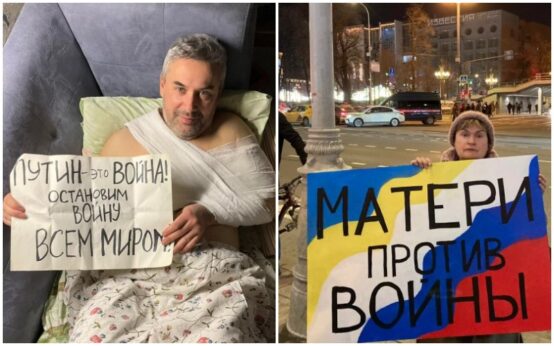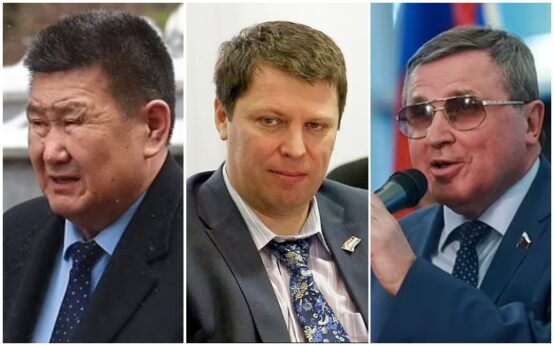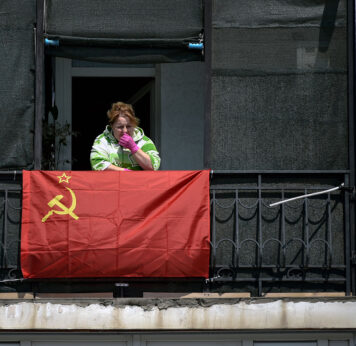
The number of Russians snatched up by police for daring to protest the Kremlin’s war on Ukraine soared past 7,600 on Thursday, according to data released by the independent Russian human rights monitoring group OVD-Info.
Mass street demonstrations broke out across the country immediately following the invasion and continue in several cities, despite the brutal force being used against protesters.
The inability of security forces to completely squelch the protests—coupled with the growing number of left-wing legislators speaking out against the war—are upsetting the efforts of President Vladimir Putin’s government to present the image of a nation standing unanimously behind him.
Brutal police response in the streets
Freelance journalist Andrey Kalikh, 49, was among those arrested in St. Petersburg last weekend. In a dispatch to the international media, he wrote: “Our society in Russia is such that instinctively we know that to go out onto the streets to protest can be a very dangerous thing.”
Despite having been on the receiving end of police violence in the past, Kalikh says even he was “surprised by how quickly and brutally the police have suppressed the wave of anti-war demonstrations” currently popping up around the country.
He went to a protest on Sunday near Nevsky Prospekt in St. Petersburg, where hundreds chanted “No to war.” Though demonstrators remained behind a police cordon set up to contain them, Kalikh reported that officers wearing armor and helmets and wielding batons rushed the crowd.
“They grabbed me by the neck, bent me down…kicked me,” he said. As he was dragged away to a waiting bus, he said he crashed along the asphalt pavement, but luckily avoided hitting his head. After being unloaded at the police station, he was transported to the hospital. He emerged with a broken arm and an order to appear in court.

In Moscow, 69-year-old teacher Irina Bogentseva was rounded up. Awaking to news of the invasion last Thursday, she said she was “in shock” and felt pushed to take to the streets. She pulled out a “Mothers Against War” poster she had made in 2015 to protest Ukraine’s war in the Donbass region. This time, however, she was protesting against her own government as well.
She was one of a handful of demonstrators in the capital city’s Pushkin Square on that first day of the war. A few minutes after she was photographed with her poster, Bogentseva was grabbed by riot police and taken, along with 20 others, to a station more than an hour away.
She was jailed overnight without access to her blood pressure medications. “They took away everything, including medicines,” Bogentseva said. “I was taken to a monkey house, a cage with bars.” Eventually, Bogentseva’s daughter heard of her detention and was able to get her mother released.
Bogentseva escaped her ordeal without injury, but not without punishment. When she appeared in court, the judge asked her if she knew the penalty for protesting illegally. She responded, “I know that freedom comes at a cost.” The judge handed down a 150,000 ruble ($1,300 USD) fine.
Government brands war opponents traitors
It’s not just Russia’s major urban areas that are seeing anti-war sentiment break out into the open. In the eastern Siberian city of Irkutsk near Mongolia, Olga Mikheeva felt compelled to speak out.
“The war is a crime both against Ukraine and Russia. I think it is killing both Ukraine and Russia,” she told the Associated Press.
“I am outraged, I haven’t slept for three nights, and I think we must now declare very loudly that we don’t want to be killed and don’t want Ukraine to be killed,” Mikheeva said.
Citizens like Kalikh, Bogentseva, Mikheeva, and others have become targets of the government.
Vyacheslav Volodin, the chair of Russia’s parliament, the State Duma, has denounced the anti-war stance of some Russians as “inappropriate” and “nothing short of a betrayal of your own people.”
Former leader of the ruling United Russia party and the advisor credited with pushing Putin further to the right in recent years, Volodin is widely seen as a possible successor to the Russian president.
Along with being jailed and labeled traitors by authorities, anti-war voices are also being erased from the public conversation in other ways.
With television already under its complete control, the government’s censorship agency and media regulator, Roskomnadzor, is reportedly in overdrive as it tries to scrub the internet of any articles or posts critical of the war.
Some Communists begin to break ranks
Opposition to President Vladimir Putin’s war in Ukraine is no longer just found in the streets of Russia’s major cities, it is now appearing in parliament as well.

Vyacheslav Markhaev, a legislator from the Communist Party of the Russian Federation (CPRF) representing Buryatia in Siberia, has come out forcefully against the war and accuses Putin of manipulating people’s concerns for the safety of ethnic Russians in the breakaway Ukrainian regions of Donetsk and Lugansk.
Along with stopping NATO expansion into Ukraine—a demand that has broad support from across the political spectrum in Russia—Putin has also claimed the invasion of Ukraine is aimed at defending those ethnic Russians living in Donetsk and Lugansk who have been at war with Ukraine since the coup overthrew the government of President Viktor Yanukovych in 2014.
An estimated 15,000 people, mostly ethnic Russians, have died in the fighting between the right-wing Ukrainian Army and its allied militia forces and the Donbas separatists.
Putin recognized the independence of the Donetsk and Lugansk People’s Republics immediately before ordering the invasion of Ukraine. He said the move was necessary to prevent another fascist massacre of Russians in the two republics.
The declared goal of the assault on Ukraine, officially called a “special military operation” by the Russian government, is to achieve the “demilitarization” and “de-Nazification” of the country.
Neo-Nazi battalions are indeed confirmed to be active in the Ukrainian Armed Forces in the region and have even been put in charge of several official military units, and the massing of Ukrainian troops along the borders of the separatist regions in recent months had fueled fears among ethnic Russians that a new campaign was being prepared against them.
Markhaev said this legitimate concern was exploited by Putin to justify an invasion he was already planning.
“To my greatest dismay, the whole campaign to have [the Donetsk and Lugansk republics] recognized was motivated by entirely different intentions, which were kept hidden. Now we have a full-scale war between the two countries,” Markhaev said in a statement on Monday.
He pointed the finger at NATO and the West for setting the current conflict in motion and providing an opening for Putin’s aggression. Referring to the 2014 coup in Ukraine that was backed by the U.S. and other powers, Markhaev said imperialist countries were “promoting their interests by changing the legitimate authority in the state in dispute [Ukraine]…under the false slogan of ‘defending democracy.’”
But he then said the Russian government under Putin was adopting “the same double standards” as Western imperialist powers by using the recognition of the independence of Donetsk and Lugansk “to hide a plan for a full-scale war with our closest neighbor.”
Markhaev’s strong anti-war stance is a break with the official position taken by most in his party. Only two other Communist members of the Duma—Mikhail Matveyev and Oleg Smolin—have so far strayed from the party line supporting the war.
Smolin, the first CPRF deputy to criticize the invasion, said he was mistaken when he thought Putin would not actually go to war. “I was convinced…our troops would stand on the line of contact and protect the population of the republics from shelling and the threat of territorial occupation by Ukrainian nationalists,” Smolin wrote in a social media post.
He said he was not the only one who thought Putin wouldn’t invade, saying, “Even President Zelensky did not believe there would be a large military operation by Russia.” Smolin looked to the end of Soviet socialism as a source of current problems: “I was and remain the opponent of the destruction of the USSR, and the problems today are the result of that tragedy.”
CPRF leader Gennady Zyuganov led the effort to push Putin to recognize the breakaway regions in the Donbass and has been enthusiastic in his support for the military’s campaign in Ukraine so far.
In a statement released on March 1, Zyuganov accused Ukrainian forces of “shelling cities under their own control” in order to “create the impression that the Russian Army is responsible for the deaths of civilians.” No evidence was offered for the claim, nor has People’s World been able to verify it.

Outside the CPRF, other leftists in Russia are also charting a path opposing both NATO and Putin.
The small Russian Communist Workers’ Party said in a statement that “from a class position, the Russian authorities, as well as the rulers of the U.S. and the E.U., do not care about working people—whether in the Donbass, Russia, or Ukraine.”
The RCWP denounced NATO and the U.S. for supporting fascist and right-wing elements in Ukraine, but also dismissed Putin’s supposed “humanitarian” concern for ethnic Russians in Donetsk and Lugansk as cover for the “true imperialistic aims of the Russian state in this war.”
While it supports the effort of Donbass residents to resist the right-wing government ruling Ukraine, it said that the efforts of “the anti-Soviet Putin” to turn the conflict into a “completely predatory war under the pretext of helping the Donbass” must be resisted.
Sergey Skvortsov, leader of a group still calling itself the Communist Party of the Soviet Union, wonders what rational goal Putin hopes to achieve now, given that NATO membership for Ukraine has essentially been taken off the table.
Even if Putin’s demands for security guarantees were fair, Skvortsov says the operation in Ukraine has “had the opposite effect from what the Russian leadership hoped for.”
Instead of splitting the NATO countries or the European Union, there has been an almost unprecedented consolidation of the West around the United States, and Russia has achieved nearly complete foreign policy and economic isolation. Even hopes for a financial backup plan with China appear to have faltered, as Beijing has ordered Chinese banks to halt payments for Russian energy.
Skvortsov estimates that Russian support for the war is well below half the population, and said “the refrigerator always beats the TV set,” predicting that the bite of Western sanctions will cause living standards to plummet further in Russia and spark stronger opposition to Putin.
The military situation may not be so rosy, either. “The hope that the Ukrainian state and the Ukrainian army would instantly crumble like a house of cards was not justified,” Skvortsov said. Besides, he declared, “the Russian oligarchic regime cannot bring freedom to the people of Ukraine.”
He concluded that the peoples of Ukraine and Russia “must not suffer because of the imprudent actions of the leadership.”
The smaller left-wing parties outside parliament who have little influence may be able to get by with criticizing the state, but for Communists inside the halls of power—those with a platform to address the mass public—it appears there could be less leeway.
CPRF legislator Mikhail Matveyev posted a direct challenge online to the course taken by Putin. According to a story in Ukrainian Pravda, he wrote:
“I believe that the war should be stopped immediately. By voting for recognition of the Donetsk and Lugansk People’s Republics, I voted for peace, not war. For Russia to become a shield, not to bomb Donbass, not to bomb Kiev.”
Matveyev’s statement has now been erased from the internet.










